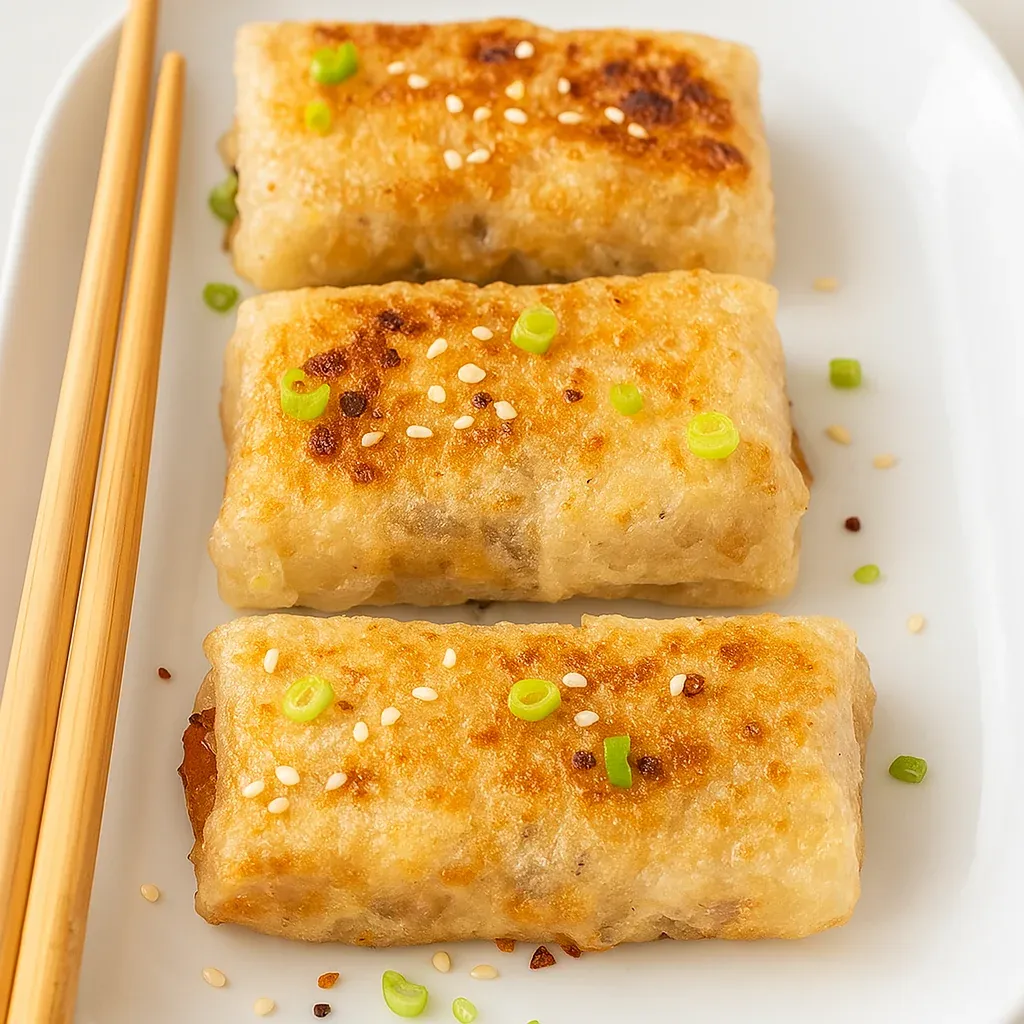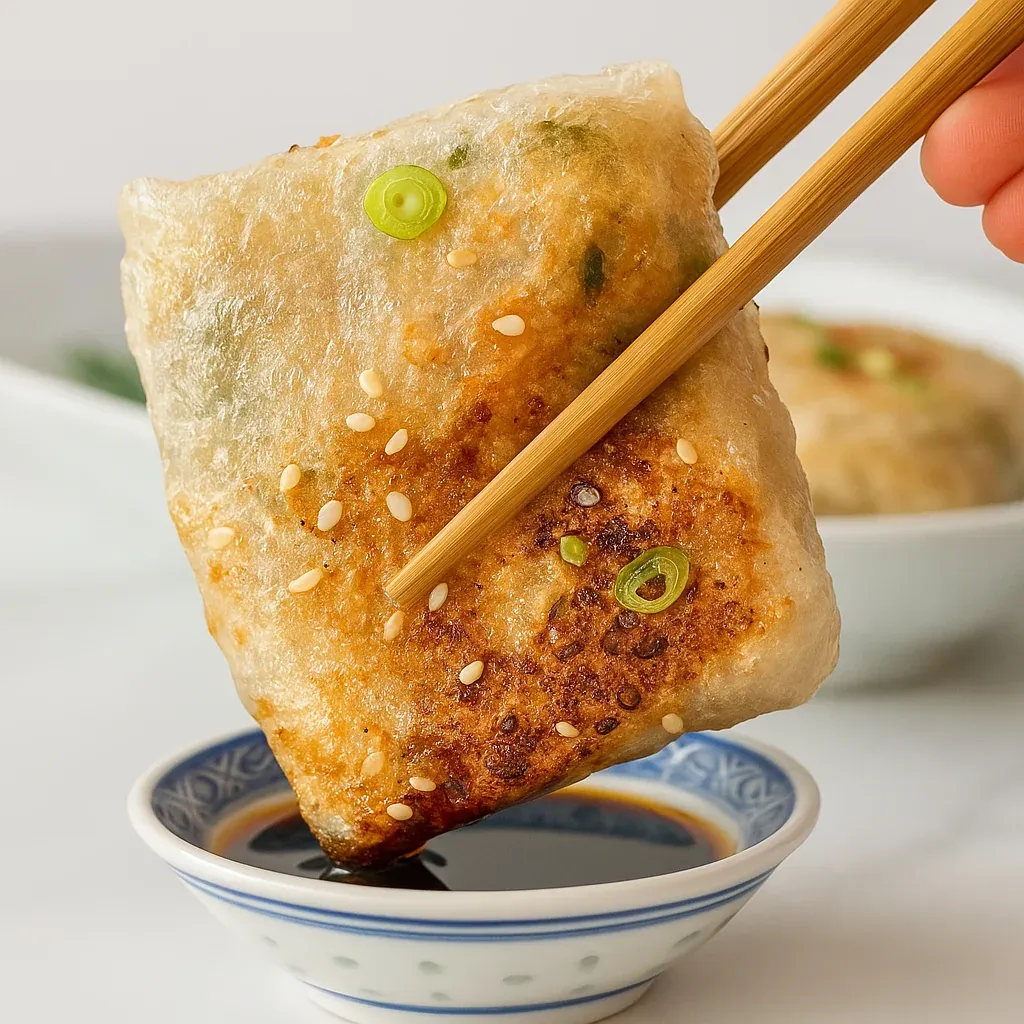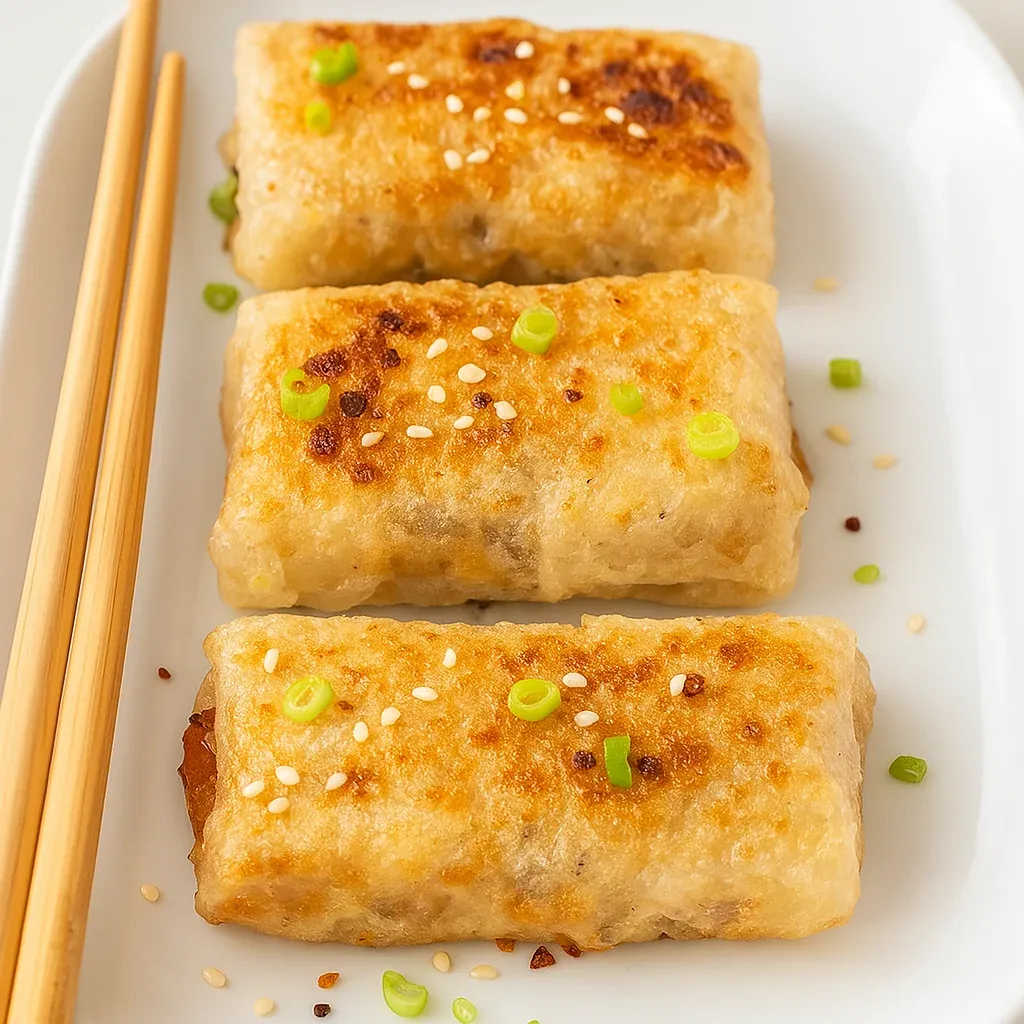 Pin it
Pin it
Rice paper dumplings are a delightful treat with their perfectly crispy exterior and flavorful filling. The combination of tofu, fresh vegetables, and Asian seasonings creates a wonderfully satisfying bite that's surprisingly easy to make at home. These dumplings offer a great way to enjoy the texture and taste of traditional dumplings with a unique rice paper twist.
I first tried making these rice paper dumplings when hosting a dinner party for friends with different dietary preferences. Everyone could enjoy them, and my vegan friend was especially thrilled to have crispy dumplings that rivaled any restaurant version.
Essential Ingredients
- Rice Paper Sheets: These thin, translucent wrappers become magically crispy when fried and are available in most supermarkets or any Asian grocery store
- Firm Tofu: Provides a hearty protein base with a pleasant texture that absorbs flavors beautifully; press it well to remove excess moisture for best results
- Mushrooms: Contribute rich umami depth and meaty texture; shiitake or brown mushrooms work particularly well here
- Carrots: Add natural sweetness and vibrant color; grate them finely to ensure they cook quickly alongside other vegetables
- Green Cabbage: Offers a subtle crunch and mild flavor that complements the other filling ingredients perfectly
- Garlic and Ginger: These aromatic foundations infuse the entire filling with warming, complex flavor
- Sesame Oil and Soy Sauce: Just a small amount of these potent seasonings brings everything together with authentic Asian flavor
The quality of your rice paper makes a significant difference in the final texture. I've found that the thinner varieties actually work better for achieving that perfect crispiness, though they can be slightly more challenging to work with at first.
Step-by-Step Cooking Instructions
- Step 1:
- Prepare your vegetables meticulously - Shred the cabbage as finely as possible, using either a sharp knife or a mandoline for consistent pieces. Grate carrots finely using the small holes of a box grater to ensure they'll cook quickly. Mince the garlic into tiny pieces to avoid any overwhelming bites, and dice mushrooms into small, even cubes no larger than 1/4 inch.
- Step 2:
- Crumble the tofu properly - Rather than chopping, use your fingers to break the tofu into small, irregular crumbles which creates more texture and better browning surfaces. Take your time with this step as uniform sized pieces will cook more evenly.
- Step 3:
- Brown the mushrooms first - Heat a tablespoon of neutral oil in a large skillet over medium-high heat until shimmering. Add the mushrooms in a single layer and resist stirring for 2-3 minutes to develop proper browning and concentrate their umami flavor.
- Step 4:
- Add remaining filling ingredients systematically - Once mushrooms have browned, add all vegetables and tofu to the pan. Stir frequently until everything begins to soften but still maintains some texture, approximately 3-4 minutes. You're looking for the cabbage to just start wilting while carrots remain slightly firm.
- Step 5:
- Season with precision - When vegetables are nearly cooked, grate fresh ginger directly into the pan (about 1 teaspoon), add 1 tablespoon soy sauce and 1/2 teaspoon sesame oil. Stir thoroughly to distribute the seasonings evenly throughout the mixture.
- Step 6:
- Incorporate fresh elements off-heat - Remove pan from heat and fold in finely sliced spring onions, allowing their flavor to mellow slightly from the residual warmth while maintaining their brightness.
- Step 7:
- Prepare your wrapping station thoughtfully - Dampen a clean kitchen towel or cutting board to create a non-stick work surface. Have a shallow dish of warm water ready alongside your rice paper sheets and prepared filling.
- Step 8:
- Master the double-wrapping technique - Quickly dip one rice paper sheet in warm water (about 3-4 seconds) and place on damp surface. Position a tablespoon of filling in center in a rectangular shape. Fold bottom edge over filling first, then top edge, followed by sides to create a neat pocket. Repeat this process with a second sheet, completely enclosing the first wrapped packet.
- Step 9:
- Cook with patience and attention - Heat a tablespoon of oil in a non-stick pan over medium heat. Place dumplings with space between them and cook 2-3 minutes per side until golden and crispy, adjusting heat if they're browning too quickly or slowly.
- Step 10:
- Rest briefly before serving - Allow dumplings to rest on a wire rack for 1-2 minutes after cooking to maintain maximum crispiness before plating with your preferred dipping sauce.
The double-wrapping technique might seem fussy at first, but I promise it's worth it. My first attempts with single wrappers often burst during cooking, but that second layer truly creates fool-proof dumplings.
 Pin it
Pin it
I've found that rice paper has become a staple in my kitchen beyond just these dumplings. My family particularly loves the unique texture it creates – that perfect balance of chewy and crispy that's hard to achieve with other wrappers. My daughter, who usually avoids vegetables, happily devours these dumplings without realizing how many good-for-her ingredients are hiding inside.
Versatile Serving Options
These dumplings pair beautifully with a variety of dipping sauces. A simple mixture of rice vinegar, soy sauce, and a touch of honey creates a perfectly balanced sweet-sour-salty complement to the crispy exterior. For added flavor, try adding a few drops of chili oil or some minced garlic to your dipping sauce.
Rice paper dumplings make an excellent appetizer for Asian-inspired meals, but they're substantial enough to serve as a main course when accompanied by a light salad or soup. The contrast of textures and temperatures works particularly well.
For a beautiful presentation, serve these golden-brown treasures on a bed of shredded lettuce with lime wedges and fresh herbs like cilantro or mint. The fresh, bright garnishes provide a wonderful contrast to the warm, savory dumplings.
Make-Ahead Possibilities
While these dumplings are best enjoyed immediately after cooking, you can prepare components ahead of time to streamline the process. The filling can be made up to two days in advance and stored in an airtight container in the refrigerator.
If you're serving a crowd, you can assemble all your dumplings before guests arrive and keep them separated on a lightly oiled surface. This allows you to focus on cooking them in batches while entertaining, rather than juggling both assembly and cooking simultaneously.
The wrappers themselves can be particularly delicate to work with, especially for beginners. Starting with slightly warm water rather than hot water gives you more time to work with the wrappers before they become too soft and sticky.
 Pin it
Pin it
Making these rice paper dumplings has become something of a meditation for me. There's something deeply satisfying about the process – from preparing each ingredient with care to mastering the folding technique that comes with practice. While they may take a little time to prepare, the results are absolutely worth it. That moment when you bite through the crispy exterior into the flavorful filling provides the kind of simple culinary joy that makes cooking so rewarding.
Frequently Asked Questions
- → Can I make these rice paper dumplings ahead of time?
- You can prepare the filling a day ahead and store it in the fridge. However, it's best to wrap and fry the dumplings just before serving as the rice paper can become soggy over time.
- → What dipping sauce works best with these dumplings?
- A simple soy sauce with rice vinegar, a touch of honey, and chili flakes works great. Sweet chili sauce or a peanut dipping sauce are also excellent choices.
- → Can I bake these instead of frying?
- Yes, you can bake them at 375°F (190°C) for about 15-20 minutes, turning halfway through. They won't be as crispy as fried but still delicious.
- → How do I store leftover dumplings?
- Store leftover dumplings in an airtight container in the refrigerator for up to 2 days. Reheat in a pan or oven to restore some crispiness.
- → Can I use different vegetables for the filling?
- Absolutely! Bell peppers, zucchini, bean sprouts, or water chestnuts all work well. Just make sure to chop them finely and cook until tender.
